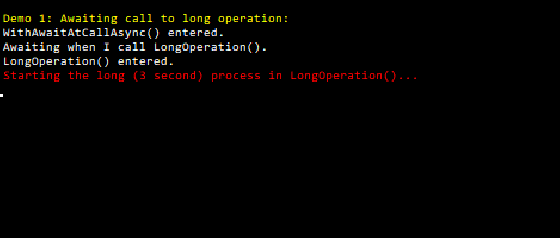Async/await has been part of C# since C# 5.0 yet many developers have yet to explore how it works under the covers, which I would recommend for any syntactic sugar in C#. I won’t be going into that level of detail now, nor will I explore the subtleties of IO and CPU bound operations.
The Common Misconception
That awaited code executes in parallel to the code that follows.
i.e. in the following code, LongOperation() is called and awaited, then while this is executing and before it has completed, the code ‘do other things’ will start being executed.
void DemoAsyncAwait()
{
WithAwaitAtCallAsync().Wait();
}
async Task WithAwaitAtCallAsync()
{
await LongOperation();
}
This is not how it behaves.
In the above code, what actually happens is that the await operator causes WithAwaitAtCallAsync() to suspend at that line and returns control back to DemoAsyncAwait() until the awaited task, LongOperation(), is complete.
When LongOperation() completes, then ‘do other things’ will be executed.
And If We Don't Await When We Call?
Then you do get that behaviour some developers innocently expect from awaiting the call, where LongOperation() is left to complete in the background while continuing on with WithoutAwaitAtCallAsync() in parallel, 'doing other things':
void DemoAsyncAwait()
{
WithoutAwaitAtCallAsync().Wait();
}
async Task WithoutAwaitAtCallAsync()
{
Task task = LongOperation();
await task;
}
However, if LongOperation() is not complete when we reach the awaited Task it returned, then it yields control back to DemoAsyncAwait(), as above. It does not continue to complete 'more things to do' - not until the awaited task is complete.
Complete Console Application Example
Some notes about this code:
- Always use
await over Task.Wait() to retrieve the result of a background task (outside of this demo) to avoid blocking. I've used Task.Wait() in my demonstrations to force blocking and prevent the two separate demo results overlapping in time (I know in hindsight, Winforms would have been a better demo). - I have intentionally not used
Task.Run() as I don't want to confuse things with new threads. Let's just assume LongOperation() is IO-bound. - I used
Task.Delay() to simulate the long operation. Thread.Sleep() would block the thread.
private static void Main(string[] args)
{
Console.WriteLine(" Demo 1: Awaiting call to long operation:");
Task withAwaitAtCallTask = WithAwaitAtCallAsync();
withAwaitAtCallTask.Wait();
Console.WriteLine(" Demo 2: NOT awaiting call to long operation:");
Task withoutAwaitAtCallTask = WithoutAwaitAtCallAsync();
withoutAwaitAtCallTask.Wait();
Console.ReadKey();
}
private static async Task WithAwaitAtCallAsync()
{
Console.WriteLine(" WithAwaitAtCallAsync() entered.");
Console.WriteLine(" Awaiting when I call LongOperation().");
await LongOperation();
Console.WriteLine(" Pretending to do other work in WithAwaitAtCallAsync().");
}
private static async Task WithoutAwaitAtCallAsync()
{
Console.WriteLine(" WithoutAwaitAtCallAsync() entered.");
Console.WriteLine(" Call made to LongOperation() with NO await.");
Task task = LongOperation();
Console.WriteLine(" Do some other work in WithoutAwaitAtCallAsync() after calling LongOperation().");
await task;
}
private static async Task LongOperation()
{
Console.WriteLine(" LongOperation() entered.");
Console.WriteLine(" Starting the long (3 second) process in LongOperation()...");
await Task.Delay(4000);
Console.WriteLine(" Completed the long (3 second) process in LongOperation()...");
}
This is what happens when the code is executed (with colouring):

Summary
If you use the await keyword when calling an async method (from inside an async method), execution of the calling method is suspended to avoid blocking the thread and control is passed (or yielded) back up the method chain. If, on its journey up the chain, it reaches a call that was not awaited, then code in that method is able to continue in parallel to the remaining processing in the chain of awaited methods until it runs out of work to do, and then needs to await the result, which is inside the Task object returned by LongOperation().
CodeProject
Ben is the Principal Developer at a gov.uk and .NET Foundation foundation member. He previously worked for over 9 years as a school teacher, teaching programming and Computer Science. He enjoys making complex topics accessible and practical for busy developers.
 General
General  News
News  Suggestion
Suggestion  Question
Question  Bug
Bug  Answer
Answer  Joke
Joke  Praise
Praise  Rant
Rant  Admin
Admin 










 Fair point. Probably should also have explained why I used Delay() over Thread.Sleep().
Fair point. Probably should also have explained why I used Delay() over Thread.Sleep().